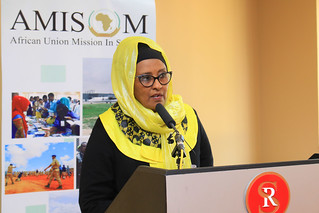
Kampala, 22 June 2019 – Senior Federal Government of Somalia (FGS) officials have expressed optimism that the country will hold peaceful and credible elections in 2020/2021 despite the political and socio-economic challenges facing the country.
Speaking at the close of the four-day workshop on electoral security and dispute resolution, in Kampala on Thursday, the officials urged all government agencies involved in the preparations to work together to achieve universal adult suffrage.
“I request parliamentarians in this workshop to advocate for ‘one-person-one-vote’ within the Senate and the house of the parliament to expedite the passing of the electoral law,” said the Chairperson of the National Independent Electoral Commission of Somalia (NIEC), Halima Ismail Ibrahim.
Ms. Ibrahim said electoral law was critical in guiding preparations, implementation, and management of future elections, adding that parliament must urgently ensure the law is passed.
Civil society groups have been pushing for the enactment of the electoral law, saying it will help enhance the participation of citizens in the country’s decision-making process.
The chairperson of the Electoral Commission of Uganda, Justice Simon Byabakama, said in order for Somalia to deliver a ‘one-person, one-vote’ election, the NIEC must urgently come up with electoral locations to enable the Electoral Security Task Force to map out security threats and carry out the necessary risk assessment.
“This will enable the task force to complete the drafting of the electoral security strategy and also come up with a clear action plan in a timely manner,” Justice Byabakama observed.
He said Uganda’s Electoral Commission was ready to offer technical support to the NIEC and urged the international community to help Somalia organise her first universal adult suffrage elections since 1969.
AMISOM Senior Political Officer, Hajji Ssebirumbi, said Somalia was on the right track to achieve secure, free and fair elections, saying electoral officials were working hard to achieve universal adult suffrage.
“We are all aware that Somalia has not had this type of elections (‘one-person, one-vote’) for the last 50 years so the essence of planning, coordination and having a strategy in place is what we are working on at the moment,” added Mr. Ssebirumbi.
The workshop also discussed the electoral disputes that may arise, using previous exercises, mainly the 2012 and the 2016 elections, as examples.
Mr. Ssebirumbi said the workshop had come up with recommendations on electoral security, which will be reviewed by the government and partners before a final strategy is published.
“Similarly there will be proposals that will be put forward on alternate dispute resolution mechanisms so that we can be able to prepare for free, fair, secure and credible elections in 2020/21,” he added.
The Director General of the Federal Ministry of Internal Security, Yusuf Ali Mohamed, emphasised that the ministry will do everything within its power to ensure there are enough officers to secure all electoral areas.
“We learnt that the security forces needed training on human rights and other basic skills and also need equipment in order to perform their duties effectively. In the coming months we will train about 2 000 police officers to help secure electoral areas,” noted Mr. Mohamed.
Dr. Abdi Fatah Tahir, a member of the federal parliament, expressed hope that the 2020/2021 elections will be successful, saying the officials have learned positive lessons from several African countries that experienced similar challenges to what Somalia is currently facing.
“We had good lessons and we can now start forming the Electoral Security Task Force for Somalia and also understand the relationship between the judiciary, the NIEC, and the forces and how they can mitigate electoral disputes,” Mr. Tahir added.
The four-day workshop, which commenced on Monday, was organised by the African Union Mission in Somalia (AMISOM).
Amisom





































